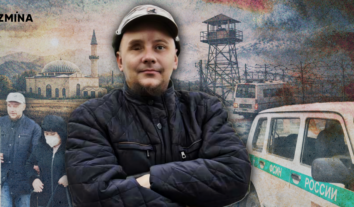A witness account of abduction and torture in Hornostaivka village, Kherson region
Serhii, a resident of the Kherson region, was kidnapped from his home on August 3, 2022. At that time, the Southern part of Ukraine, located on both banks of the Dnipro River, had been under the control of the Russian occupying forces for almost five months. At first, the man was kept at the commandant’s office of Nova Kakhovka, a small city on the left bank of the Dnipro River, for some time. Then, Sergii was transferred approximately 50 km East to the former police station of the village of Hornostaivka. While in detention, the Russian occupying forces tried to persuade Serhii to collaborate and point to weapons caches. He refused. On December 22 of last year, Serhii was finally released with a few other civilians.
Read a full witness testimony of Serhii, a Kherson region resident, about his abduction and torture experience. Due to safety concerns, ZMINA changed the name of the torture survivor.
 A photo of a place of detention. ZMINA
A photo of a place of detention. ZMINAOn the morning of August 3, 2022, when Serhii was going to work, seven or eight armed Russians broke into his house. The man immediately lay on the floor because he thought the shooting would start now. Without explaining anything, the Russian military began to beat him with their legs and rifle butts. Serhii asked them to take him outside because he did not want his little daughter to see what came next.
“I didn’t have time to get dressed, so they took me outside in underwear. There, the Russians continued to physically abuse me and put a machine gun to my head. My car was parked near the house, and they demanded I give them its keys. They tried to start it but were unsuccessful,” says Serhii.
He recalls that the Russians constantly reproached him for having anti-Russian rhetoric and pro-Ukrainian views, holding rallies and refusing to cooperate with them. Also, the Russian occupying forces kept asking the man where weapons could have been stored.
While searching his house, the Russians found Serhii’s registered hunting rifle and cartridges. They “confiscated” everything and took it with them. Having finished the interrogation, the Russian occupying forces pulled a hat over the man’s head, put him in a minibus, and took him to the house of Oleksandr Slisarenko, a director of the communal entity “Tercentr” (nothing is known about Oleksandr’s fate to this day). There, they continued to beat Serhii, demanding to show weapons caches. They allegedly found one of them: five or six Kalashnikov assault rifles, several grenades, and cartridges were offered as evidence.
Serhii explained that since Oleksandr Slisarenko was a representative of the local historic community organization, “Gornostaivsky Kurin of the Zaporizhzhya Army,” the Russians believed that he was hiding weapons:
“I said that I don’t know anything about weapons and don’t understand what it’s about. It was only later that I guessed that the Russians were looking for weapons in Cossack organizations [organizations that preserve history and knowledge about a society that evolved in the southern steppe frontiers of modern Ukraine in the XV century known for its excellence in martial arts], which they considered being connected to Bandera [a leader of Ukrainian nationalist organization that fought against Soviet regime in the XX century]. They interrogated me in Oleksandr’s yard for about half an hour. Then, they put me in the car again and took me somewhere.”
According to Serhii, the Russians also used physical violence against Oleksandr Slisarenko. After all, he heard cries and screams that came from time to time from Oleksandr’s house.
Later, Serhii was again put in the car, where the Russian occupying forces continued to beat him and encourage him to cooperate. But he refused. The man was driven around the village for some time, and then the car stopped near the commandant’s office in Nova Kakhovka. There, the occupiers kept together Ukrainian servicemen, civilians, and residents of the so-called “Donetsk People’s Republic” or “DPR,” a territory of the Donetsk region in the Eastern part of Ukraine, occupied by Russia since 2014. Serhii was held there from August 3 to August 15, after which he was transferred to the commandant’s office in Hornostaivka.
“In the first two weeks, the Russians interrogated me five times. Additionally, two or three people were in the room, among whom were sometimes representatives of the Federal Security Services (FSS) and, at least once, representatives of the Russian prosecutor’s office. I was accused of taking a pro-Ukrainian position because some residents and I held pro-Ukrainian rallies at the beginning of the occupation. I was also blamed for refusing to distribute their humanitarian aid and instead creating our own humanitarian headquarters, whose volunteers bought products and delivered them to the villages [using their own means],” says Serhii.
The Russian occupying forces demanded to provide them with lists of the current and former Ukrainian military personnel who served in the Joint Forces Operations (JFO) in the Eastern part of Ukraine from 2014 to 2022. Instead, the man argued that after the launch of the decentralization reform in 2014, he did not have such documents.
Many veterans were exposed by collaborators among the locals. They were usually held in former police stations in Nova Kakhovka and Hornostaivka.
In Nova Kakhovka, Serhiy was kept in the same cell with three people from “DPR,” whom the Russians accused of looting. Later, Russian military officer Suren Mkrtchyan, who got there because of some conflict, was imprisoned with them too.
“Suren told us that he treated the locals with respect. But I heard from others that he oppressed the local population and tortured them. Regarding the others, two people from “DPR” were construction workers who went to Poland and the Czech Republic during the JFO. The third was a businessman with an officer’s rank. The Russians mobilized all three men [from Eastern Ukraine],” Serhii testifies.
In Hornostaivka, he was initially kept in a solitary cell and later transferred to a shared cell. He ended up in a cell together with 70-year-old Volodymyr Yakub, a young guy Yuriy, former director of the “Yunist” cinema in Novaya Kakhovka, Andriy Khodorkovsky, and JFO serviceman Oleksandr Kuzyominsky. The latter was a Cossack centurion, a historian, and taught children the martial art of fencing, archery, and the history of the Cossacks.
“They asked Volodymyr to show where the weapons were hidden. Yuriy was detained near the city park, where the Russian military unit was stationed. He was immediately called a saboteur and brought here. The guy was beaten and interrogated, but later, the Russians realized he was strange. He did not speak well and could barely write. He was held for a short time and later released. The occupiers also asked Oleksandr about weapons,” Serhii recalls.
He said that the solitary cell had a toilet and bottled water, and instead of a bed, there were boards. Closer to autumn, he was given a Belarusian-made sleeping bag. They fed porridge or mashed potatoes during the day and evening. When he was sitting in a shared cell, they gave out one loaf of bread or five galettes to share among everyone. In November, many Russians were sent from the commandant’s office in Hornostaivka to the Donetsk region. So there were not enough people in the kitchen, and the Russian occupying forces forced the teacher, who was also kept there, to cook for the prisoners.
“She tried to cook the first and second courses, gradually increasing the portions. You could even ask for tea. They gave me jeans and a T-shirt from the clothes, and then, when we gave them the office equipment from the village council, which our employees had hidden, I asked my colleagues to bring me a sports suit. In addition, there were someone’s things left in the cell, which we took for ourselves,” Serhii shares.
Serhii put on the washed clothes and quickly walked back and forth in the cell for 40 minutes so that they would dry faster on him. Prisoners were taken to the shower once a month. To maintain elementary hygiene, the men diluted tea with cold water on other days.
On December 22, 2022, Serhii was the last released from the commandant’s office.
ZMINA Human Rights Center, together with Ukrainian and international partners, documents incidents of enforced disappearances, detentions, and abductions of civilians in the temporarily occupied territories of Ukraine. If your relatives have disappeared or you have fears that they might have been kidnapped, please write to our e-mail address es@humanrights.org.ua. Our representative will contact you.
With the consent of the applicant, the received information will be used for appeals to national and international investigative bodies, as well as international organizations, in particular to the United Nations (UN) Committee against Torture, the UN Independent International Commission of Inquiry into the Events in Ukraine, the UN Monitoring Mission on Human Rights in Ukraine, the International Criminal Court, etc. to document and further investigate war crimes committed in Ukraine and bring the guilty to justice.














